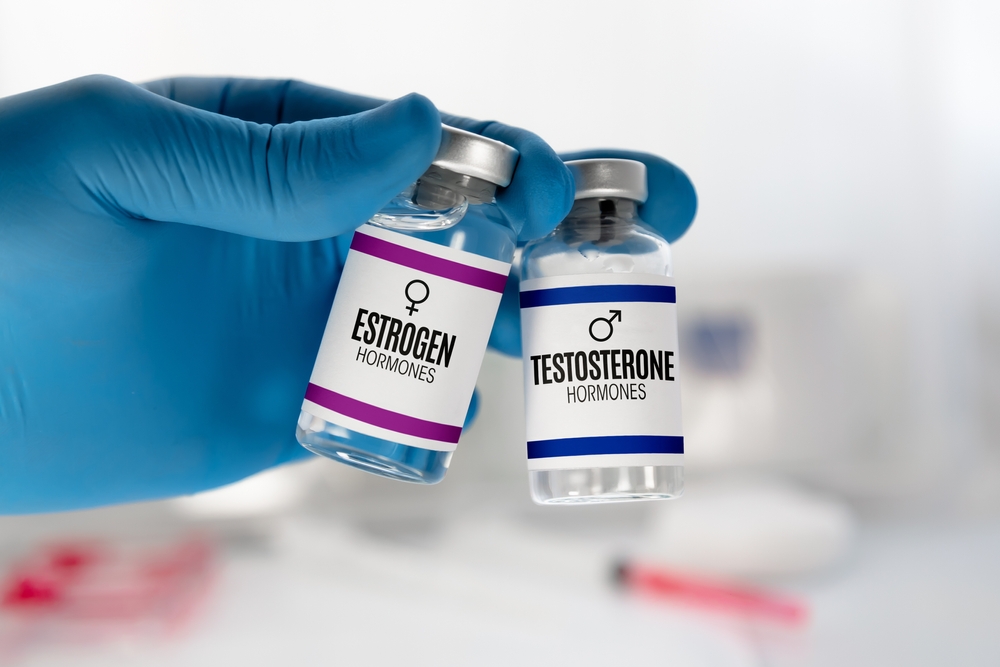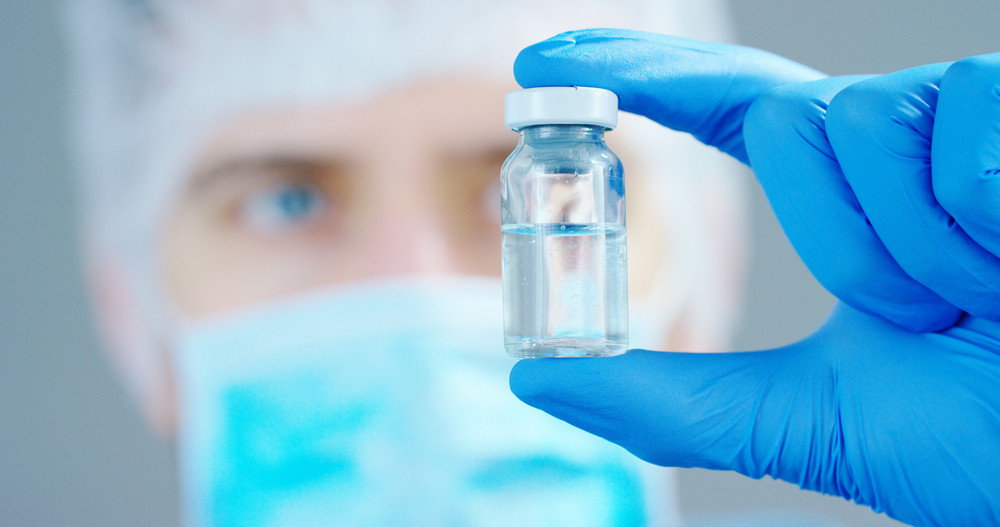For years, estrogen therapy was—and continues to be—prescribed as a treatment for women experiencing symptoms of menopause. Estrogen is a sex hormone found in both men and women (though in smaller amounts in men). The main source of estrogen is the ovaries in women, although the adrenal glands also make small amounts of this hormone [1]. It’s been known that having too much or too little estrogen can cause negative effects on the body.
As early as 1896, the ovaries were recognized to influence breast cancer, as some women with breast cancer improved when they had their ovaries removed. However, estrogen itself wasn’t discovered as a hormone until 1923 [2]. Doctors began prescribing estrogen to women who were going through menopause or had had their uterus removed to prevent menopausal symptoms, which can include hot flashes, mood swings, anxiety, and vaginal dryness [3].
However, today, research acknowledges that “a causal relationship” exists between synthetic estrogens and breast cancer incidence in postmenopausal women [4]. Let’s take a closer look at why these hormones are still prescribed today and why there remains much confusion about the risks.
Estrogen and Menopausal Hormone Therapy

Menopausal hormone therapy is a form of treatment where a female patient who’s experiencing symptoms of menopause is prescribed estrogen, which her body will cease to produce once menstruation stops [5].
Menopausal hormone therapy typically includes estrogen alone or estrogen combined with progestin, a synthetic version of progesterone—another sex hormone found in both males and females. Women with an intact uterus will usually get the combination of the two hormones, while women without their uterus will receive estrogen alone [6]. So, why did millions of women receive this treatment without being warned by their doctor of the risks, especially an increased risk of breast cancer?
Read More: Cancer is Adaptive and Can Switch Sugar for Fatty Acids to Spread Around the Body
Years of Medical Advice without Science to Back It Up

Although there were concerns that this treatment could contribute to the development of breast cancer, many physicians believed that the benefits outweighed the risks. So for over half a century, “multiple observational studies” were used to justify the beneficial effects of menopausal hormone therapy until a randomized clinical trial was done [7].
Women on these hormones seemed to have lower heart attack rates, and since heart disease was (and continues to be) the number one cause of death of women, these hormones seemed like a beneficial form of treatment all around [8].
However, there were other factors involved—for example, women who had access to this form of therapy also tended to be of higher socioeconomic class, which means they not only had a healthier diet but had regular checkups and tended to participate in exercise, which would have worked to lower their heart attack risk [9].
Doctors continued to prescribe estrogen without much science to back up this form of treatment—that is, until a large experiment conducted in the 1990s called the Women’s Health Initiative revealed the dangers of menopausal hormone therapy.
What the Women’s Health Initiative Studies Revealed

Hormone therapy for menopausal women isn’t only given to curb symptoms of menopause. It may also be used to manage risk for osteoporosis and heart disease later in life [6]. However, research was soon published that prompted millions of women to stop taking their hormone medication.
One study was done on women from 50-79 years of age who had their uterus intact. These women received combined estrogen and progestin as a form of treatment and experienced invasive breast cancer and heart disease as a result. Based on the invasive breast cancer, the trial was halted prematurely [10].
The study concluded that the risks outweighed the benefits when using combined estrogen and progestin in healthy postmenopausal women [10].
Another study looked at women without their uteruses with estrogen therapy alone. These women, who spanned the same ages as the other group, saw an increased risk of stroke and blood clots, although an insignificant decrease was found in breast cancer incidents [11].
Before the Women’s Health Initiative, estrogen was the most prescribed drug in America, netting $1 billion in sales [12]. In the year following, the number of prescriptions plummeted, and so did incidents of breast cancer [9].
Read More: Is Decaf Coffee Safe to Drink? Advocacy Groups Highlights Additive Linked to Cancer
So Why Didn’t Doctors Caution Their Patients?

It’s important to understand that there are different types of breast cancer, and not all of them are sensitive to hormones, although the majority—75 percent—are [2]. It’s also essential to acknowledge the role of estrogen in patients with differing hormone needs. Based on some research, when applied appropriately, hormone replacement therapy is considered to be beneficial [13].
Using hormone therapy for a limited amount of time a certain amount of time after menopause, experts insist that it has benefits, but only when used short-term and only as necessary [14]. Today, the role of estrogen in breast cancer continues to be controversial. Some research shows that women who have had their uterus removed benefit from hormone replacement therapy and have fewer heart attacks [3].
For years, doctors believed the benefits of hormone replacement therapy for menopausal women outweighed the risks—with the results of the Women’s Health Initiative in 2002, things seem to have changed. The problem is that patients and physicians alike are often in disagreement about the appropriate use and benefits of estrogen therapy.
What You Need to Know Today

Here’s the takeaway regarding menopausal hormone therapy in our modern world.
- Your body is unique. Not every woman going through menopause needs estrogen therapy.
- Hormones are not a long-term solution. Most medical experts agree that menopausal hormone therapy should not be used long-term [15].
- Some estrogen is made from animals. Premarin is the only hormone replacement drug for women that’s made from the urine of pregnant female horses, which may raise ethical concerns for some patients [16].
- Don’t neglect the power of diet and lifestyle. Menopause can be better managed through diet and lifestyle changes and doesn’t always need pharmaceutical medication to curb symptoms [17]. (In addition, the word symptom is often associated with disease, which menopause is not!)
- Transgender women are affected too. Transgender women may take Premarin to induce female sex characteristics during their physical transition [18]. Some research shows that while taking these hormones, transgender women experience an increased risk of breast cancer [19].
- Watch out for pharmaceutical birth control. If you take oral birth control, you also have a slightly increased risk for breast cancer, as these hormones raise estrogen levels in the body [20].
Today, your choice to take estrogen is an individual decision that can only be made by you after reviewing the risks and benefits with your trusted physician!
Read More: Video Time-Lapse Shows How Dark Patch of Skin Turns Into Melanoma Cancer
Sources
- https://www.hormone.org/your-health-and-hormones/glands-and-hormones-a-to-z/hormones/estrogen
- https://www.urmc.rochester.edu/ob-gyn/ur-medicine-menopause-and-womens-health/menopause-blog/january-2016/is-all-breast-cancer-the-same-a-paradox-estrogen-s.aspx
- https://medicine.yale.edu/news-article/11460/
- https://www.ncbi.nlm.nih.gov/pubmed/9625169
- https://www.mayoclinic.org/diseases-conditions/menopause/in-depth/hormone-therapy/art-20046372
- https://www.cancer.gov/about-cancer/causes-prevention/risk/hormones/mht-fact-sheet
- https://www.ncbi.nlm.nih.gov/pmc/articles/PMC3897322/
- https://www.who.int/gho/women_and_health/mortality/situation_trends_causes_death/en/
- https://nutritionfacts.org/2019/08/20/why-did-doctors-keep-prescribing-cancer/
- https://www.ncbi.nlm.nih.gov/pubmed/12117397
- https://www.ncbi.nlm.nih.gov/pubmed/15082697
- https://www.urmc.rochester.edu/ob-gyn/ur-medicine-menopause-and-womens-health/menopause-blog/february-2016/the-history-of-estrogen.aspx
- https://www.aarp.org/health/conditions-treatments/info-2018/menopause-symptoms-treatment-estrogen-hrt.html
- https://www.aafp.org/afp/2012/1101/p864.html
- https://www.womens-health-concern.org/help-and-advice/factsheets/hrt-know-benefits-risks/
- https://www.ourbodiesourselves.org/book-excerpts/health-article/history-hormone-treatment-menopause/
- https://www.pcrm.org/good-nutrition/nutrition-information/a-natural-approach-to-menopause
- https://www.ncbi.nlm.nih.gov/pmc/articles/PMC5182227/
- https://www.bmj.com/content/365/bmj.l1652
- https://www.breastcancer.org/research-news/do-hormonal-contraceptives-increase-risk
- https://nutritionfacts.org/2019/08/20/why-did-doctors-keep-prescribing-cancer/

